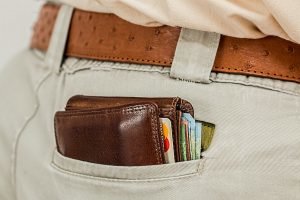
Credit Card Fraud And How To Avoid It

One of the scariest things that can happen to you in this day and age is having your identity stolen. And a big part of that issue is someone managing to steal your credit card information. You need to protect this information at all times and be on guard for those who want to scam you.
But, what are the steps that you need to take in order to avoid credit card fraud? What can you actually do to decrease the possibility of getting scammed? Here are our best tips:
Keep your card safe
 We are starting with the most obvious tip of all: Keep your actual credit cards in as safe a place as you can. If you have a need to carry it on your person place it somewhere close to your body where it cannot be easily snatched away. Using an inner pocket of a zipped-up jacket is one of the ways to keep it safe. If you are using your purse, always double check to see if it is zipped. If you can do it, also consider using a smaller purse since it is actually harder to steal from a smaller purse.
We are starting with the most obvious tip of all: Keep your actual credit cards in as safe a place as you can. If you have a need to carry it on your person place it somewhere close to your body where it cannot be easily snatched away. Using an inner pocket of a zipped-up jacket is one of the ways to keep it safe. If you are using your purse, always double check to see if it is zipped. If you can do it, also consider using a smaller purse since it is actually harder to steal from a smaller purse.
If you have multiple credit cards, only carry those that you plan on using during that day and keep the other ones in a safe place in your home.
Avoid having your credit card out in the open
Another way thieves can actually steal your money is taking pictures of your credit card. As you know, everything you need to place an online order is written on the surface of your credit card. Once they get your card number, the expiration date and the security code on camera, they are good to go.
So, you should avoid leaving your credit card exposed any longer than it must be. Once you make your purchase, put it back into a safe place immediately.
Destroy your billing statements
Your billing statements can actually have your full credit card number (and other, potentially important information) printed on them and you do not want someone to see that number. Destroy them to avoid any dumpster diver from getting your credit card information. This also goes to old credit cards that you have canceled or that have expired.
Review your billing statements
We know that it can be a drag, but it only takes minutes and does a lot to protect you from potential theft. Go through your billing statement every month, and if you see any charge that was not made by you, report it as soon as possible. No matter how big, or small the charge is! From that point on you might even be advised to close your account and get a new one so you can avoid any further fraud.
Never leave a credit card receipt blank if you are going to sign it
If you sign a blank receipt and the cashier suddenly decided to rob you, they could write in an amount in a blank space and forward the “purchase” to your credit card issuer. This can lead to a lot of trouble and your signature is something that would put a nail in the coffin of your arguments in the case the entire thing goes to court. So, if you ever get a receipt that still has blank fields, either write in 0 (zero) dollars in them or simply strike them out by drawing through them.
Do not give away your credit card information
Unfortunately, there is a lot of people out there making fake calls claiming to be your bank, a business you frequently shop in or even a charity. And they all ask of you to give them your credit card number. Remember, only give your credit card information (or any other sensitive information) during calls you initiated. That is the only way you can be 100% certain that you are talking to the person you want to.
Be super safe online
This is somewhat of a given nowadays as most of us know that most of the emails and websites contain traps we can easily fall into. Remember, do not follow any links that want to have your credit card information, no matter how legitimate the email can seem.
Even the link you click on can look exactly like the usual homepage you expected it can still be a scam. If you want to open your account online always manually visit their website and never follow any links in your emails that you didn’t specifically request or have verified with your credit card issuer personally.
More in Bank Stories
-
Here Are the Basic Table Etiquettes Most People Get Wrong
In the realm of dining, table manners are not just about following a set of rules: They are a dance of...
December 19, 2023 -
Turn Your Rental Space Into Your Home With These Effective Tips
Get to Know Your Boundaries Before you start planning your mini-makeover, it is crucial to understand the limitations set by your...
December 14, 2023 -
Brewing Controversy: Unraveling the Bud Light Boycott
In a world fueled by opinions, the recent Bud Light boycott has stirred quite the commotion. It’s not your typical tale...
December 7, 2023 -
How LVMH Became a $500 Billion Luxury Empire
LVMH Moët Hennessy Louis Vuitton is a name synonymous with luxury and opulence. The brand has crafted not just products but...
December 2, 2023 -
Women Spend 20% More Per Year on Out-of-Pocket Health Costs
A recent report from Deloitte has brought to light a concerning issue in the world of healthcare – women spend a...
November 24, 2023 -
How Sound Baths Can Soothe Your Mind, Body and Soul
Have you ever been so caught up in a song that you felt the world melt away? Music, in its many...
November 18, 2023 -
What to Know Before Rebalancing Your Investment Portfolio
Managing an investment portfolio is akin to steering a ship through ever-changing waters. Periodic adjustments are necessary to ensure you stay...
November 11, 2023 -
Jeff Bezos and Fiancée Lauren Sánchez’s Extravagant $500 Million Superyacht
Get ready to set sail on a journey into the opulent world of Amazon founder Jeff Bezos and his fiancée Lauren...
October 31, 2023 -
How to File Your Taxes: A Comprehensive Guide
Filing your taxes can be daunting, but with the right knowledge and preparation, it doesn’t have to be overwhelming. Taxes are...
October 26, 2023
















You must be logged in to post a comment Login